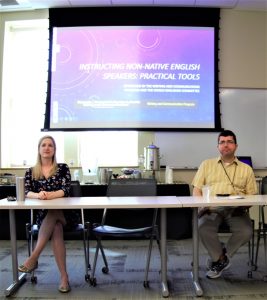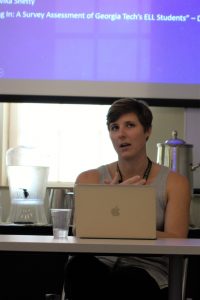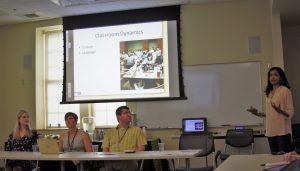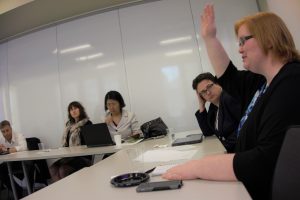On March 30, 2017, the Writing and Communication Program’s World Englishes Committee hosted the faculty roundtable “Instructing Non-Native English Speakers: Practical Tools.” This event drew Georgia Tech teaching faculty and staff interested in sharing ideas and learning new strategies for better serving the needs of the diverse population of English Language Learners (ELL) in our courses. Brittain Fellows Julie McCormick Weng and Sarah Whitcomb Lozier-Laiola spoke at the event, and were joined by Peter Fontaine, Associate Director of the Communication Center, and Malavika Shetty, Lecturer in the School of Literature, Media, and Communication.

Julie McCormick Weng (left) and Peter Fontaine (right) prepare to address the faculty and staff members attending the roundtable event.
At the event, the speakers discussed and distributed practical resources for engaging non-native speakers that could be adapted to multiple courses. For example, Weng opened the event by sharing her first-day-of-class student handout, a biographical survey that includes questions about students’ contact information, preferred names, and majors, as well as inquiries about their native languages and familiarity with English educational settings. The survey concludes with a set of course-specific questions about the students’ previous writing experiences and goals for the semester. Beyond the insights gained from the students’ responses, Weng explained that the survey indicates to students her interest in their individual backgrounds while also allowing her to evaluate her students’ writing proficiencies before the semester’s coursework begins.

Sarah Whitcomb Lozier-Laiola offers strategies for assessing the ELL student writing produced in team-based projects.
Fontaine contributed to the event’s emphasis on sharing practical tools by discussing one excellent resource for both faculty and students: the Communication Center. He explained that the Center employs a number of professional tutors with specialized experience and training in assisting non-native English-speaking students. Fontaine also highlighted the Center’s enthusiasm for working with faculty to develop course-specific workshops for students (such as a workshop on oral presentation strategies) that respond directly to the needs of both students and classwide goals.
With years of experience serving ELL students, Lozier-Laiola reflected on collaborative student projects and the specific challenge of providing an inclusive environment for junior and senior ELL students working in team-based courses cross-listed in Computer Science and Technical Communication. She posed a number of questions: How should instructors respond to the needs of ELL students who produce work in teams? How can instructors facilitate the writing practice they need and also assess that practice when the grades are collaborative and often mediated through the particular dynamics (whether inclusive of the ELL student or not) of the team? Lozier-Laiola explained her strategy: making certain that group members address, in a supplementary worksheet, their contributing roles within the group, as well as asking them to cycle through different positions with the group, alternating between tasks that emphasize writing and others that do not.

Malavika Shetty (far right) explains the importance of recognizing cultural differences among ELL students at Georgia Tech.
Shetty focused her presentation on the difficult art of offering feedback on ELL student writing. Within the category “non-native English speaker,” Shetty pointed to a wide range of cultural differences among individual students that affect traditional markers of class performance such as providing citations and giving credit, participating in class, and organizing arguments. Shetty reinforced the importance of helping all students in the class to understand cultural differences as resources in themselves, rather than obstacles to be overcome. She also suggested that faculty provide ELL students with tools to self-edit their writing, such as identifying–but not explaining–sentence-level errors in student work, and then encouraging that student to take initiative to figure out the precise nature of the errors.

A robust conversation among panelists and roundtable participants followed the four brief presentations.
To round out the discussion about ELL students at Tech, Weng shared the results of a survey designed by the World Englishes Committee and distributed among students in first-year writing courses. The survey revealed the kinds of resources ELL students would like to see to help support non-native speakers at Tech, as well as how faculty can further support their comprehension of course material. For example, students recommended that faculty speak more slowly, use less slang, offer written (and not just oral) instructions for assignments, and affirm to their students that they are available for individual assistance during office hours.
Overall, the range of resources, strategies, and tips shared at the roundtable showcased the ongoing interest shared among Tech faculty in serving and supporting non-native English speakers in our courses. In future semesters, the World Englishes Committee hopes to offer additional opportunities for ELL students at Tech to share their experiences with faculty, and to continue helping faculty to develop thoughtful teaching strategies in turn.
